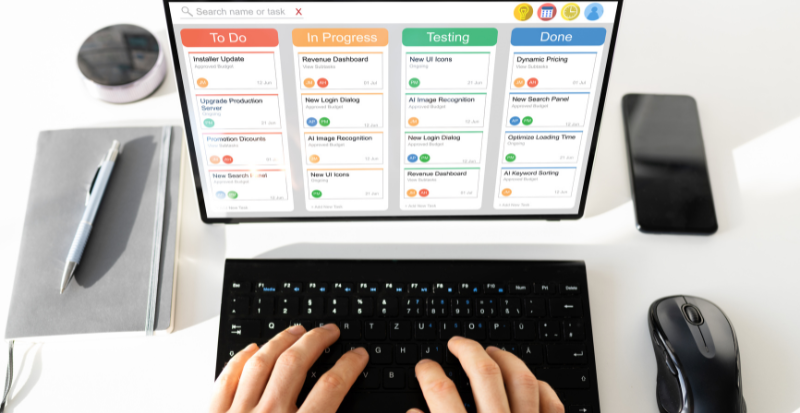Agile Development
At Shri Sai Tech Solutions, we believe that the key to achieving faster, more efficient, and high-quality results lies in Agile Methodology. By embracing Agile practices, we ensure your software development projects are adaptable, scalable, and delivered on time, meeting your business goals with precision.
Agile is a project management approach that promotes flexibility, collaboration, and continuous improvement. It focuses on delivering incremental value through short, iterative cycles called sprints, ensuring that you can see progress quickly and provide feedback throughout the process. This approach minimizes risks, increases productivity, and helps create software solutions that are more closely aligned with your evolving needs.
Schedule an online meeting

Our expertise covers the following Agile Development:

Our expertise covers the following Agile Development services, including iterative development, sprint planning, and continuous feedback loops. At Shri Sai Tech Solution, we help businesses deliver high-quality software faster by adopting Agile methodologies that ensure flexibility, scalability, and efficiency in every phase of development.

At Shri Sai Tech Solution, we provide Agile Development services designed to optimize team collaboration, enhance project transparency, and improve delivery timelines. Our Agile approach adapts to changing business needs, ensuring that your software evolves iteratively and efficiently, meeting market demands without delays.
What is Agile Methodology?
Agile methodology is a dynamic approach to project management and software development that emphasizes flexibility, collaboration, and continuous improvement. Unlike traditional project management methods, Agile focuses on delivering small, incremental improvements rather than working toward a single, large-scale release. This approach is widely used in the development of software solutions but is also applied to a variety of other industries due to its effectiveness in adapting to changing conditions.
Key Principles of Agile:
-
Flexibility and Adaptability: Agile promotes a flexible and iterative process, allowing teams to adjust their approach as the project progresses. This adaptability is especially valuable in environments where requirements may evolve or where new insights are gained as the project moves forward.
-
Collaboration and Communication: One of the core tenets of Agile is the emphasis on constant communication and collaboration. Teams regularly meet to discuss progress, identify challenges, and ensure that everyone is aligned with the project goals. This collaboration includes not only the development team but also stakeholders and customers, who are actively involved throughout the process.
-
Iterative Development: In Agile, work is broken down into smaller, manageable units called sprints, which are typically short cycles of 1-4 weeks. At the end of each sprint, a usable product increment is delivered, and feedback from stakeholders is gathered. This allows the development process to be refined and adjusted based on real-time feedback, ensuring that the final product meets the business goals and customer needs.
-
Continuous Improvement: Agile is built around the idea of continuous improvement. Teams conduct regular reviews and retrospectives after each sprint to assess what went well and what can be improved. This iterative learning process helps teams refine their practices and make ongoing adjustments to enhance productivity, quality, and delivery times.
-
Customer-Centric Approach: Agile places a strong focus on customer satisfaction by delivering high-quality software that meets the customer's needs. Agile teams work closely with customers or end-users to ensure that each increment of the product delivers value and is aligned with customer expectations.
-
Emphasis on Individuals and Interactions: Agile prioritizes the value of individuals and their ability to work effectively together. Instead of rigid processes, Agile encourages a culture of trust and self-organization, where team members are empowered to make decisions and solve problems collaboratively.
